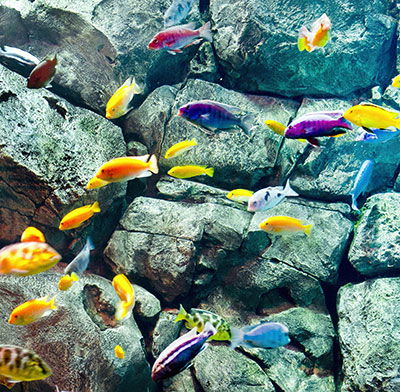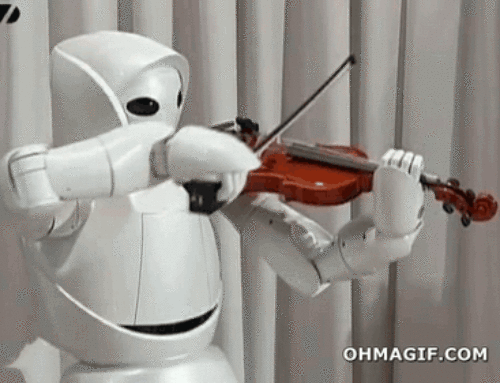I went to the Silver Diner in Federal Plaza on Saturday to grab a quick lunch and was overcome with nostalgia thinking of Ricardo and Benjamin who ate there often. The last time Ricardo was a lonely widower and Benjamin told him about his experiments on cactus that ultimately led to cactein in my novel Jellyfish Have Eyes.

Cichlid fish in aquarium
Oh my god! They’re in the booth across the aisle right now. What a coincidence. Ricardo looks very tired. He must be pretty close to ninety. Benjamin looks great, as usual, despite his age. Nothing ever bothers him, lucky bastard. Makes me sick. They don’t recognize me. That’s the good and bad of being an author: you don’t exist anymore once your characters take center stage. Consider Sherlock Holmes or Don Quixote. Does anyone really care whose baby they were? Sherlock’s his own man in his characteristic hat, so is the gallant Don, even if he’s paper-thin in his coat of armor.
“Would you do it again, Ricardo, your jellyfish research, now that you know how much trouble you can get into making discoveries ahead of the times?”
“I suppose. I’m still convinced that jellyfish have a brain of sorts that has some ability to remember, no matter what anyone says. It’ll be big-time some day. Too bad I’ll be dead. Why do so many people discount unexpected possibilities, even ridicule them? I guess discoveries that don’t fit into anyone’s frame of reference or expectation are defined as ‘ahead of the times,’ if they turn out to be correct, that is. Strangely, I had more sense when I was young than I do now and knew what to ignore.”
“What to ignore?”
“Yeah. Did I ever tell you about what I call the ‘ahaa’ moment that I wanted to study?”
“No.”
“After my sophomore year at college I was an intern at UCLA for the summer studying a type of behavior called imprinting. In a nutshell, cichlid fish – these are common tropical fish that kids buy for their home aquariam – become imprinted on the first baby fish they see after laying eggs and then fanning the developing embryos with their fins to keep a stream of oxygenated water over them until hatching. What imprinting means in this case is that the parent fish have a way to recognize and then care for the first babies they see after laying and fanning eggs. Even if one of the hatchlings gets separated from the school of babies, the parent goes after it, sucks it into its mouth and spits it back to join its siblings. No one knew at that time how these parent fish recognize – become imprinted on – the first baby fish they see. At least that’s my recollection; it was a long time ago. I was intrigued on how imprinting worked in the brain. The baby fish are no more than a speck in the water and they don’t look any different than any other baby fish, at least to us. Is it sight, or smell, or taste, or some squeak in the water they make, which seems unlikely, that the parent fish recognize? How the heck do these parent fish “know” which babies are theirs? I haven’t kept up with the research in the area, but I bet no one knows the answer yet.”
“So what, Ricardo? Do you plan on marrying a cichlid fish or a guppy and having guppy babies?”
“Damn it, Benjamin. No!”
I see that Benjamin hasn’t lost his sarcastic streak, or has he gotten cocky after all his success? Wait, Ricardo is going to say more.
“After that summer I took a bunch of animal behavior courses at college and considered doing research on the role of the brain in controlling behavior and how people, or any animal thinks. There was a lot of amazing research going on in the compartmentalization of brain activity then. The brain was, and still is, considered a frontier for biologists.”
“Now you’re ahead of ‘my times’ Ricardo. What’s the “ahaa” moment you mentioned?”
“It still fascinates me, Benjamin. My naïve idea was to determine what happens in the brain at the moment a thought, or someone’s name one can’t remember, suddenly flashes in mind – the ‘ahaa’ moment that makes one exclaim, ‘Oh yes! I get it,’ or, ‘I remember.’ Something happens in the brain, either biochemical, or biophysical, or whatever, and it’s under some kind of voluntary control because it occurs when you try to remember or understand something. I didn’t think there was enough known to even approach the problem then. I guess I was a research coward, although maybe I was right. I’ll never know. But how fascinating the idea was at the time, and still is – the brain biology of a thought, or maybe an epiphany. How do the different parts of the brain interact to culminate in thought or behavior of any kind? If only I had more than one life to live.”
“Wow! There’s an idea: reincarnation.”
I hope Ricardo ignores Benjamin this time. Why is he so sarcastic? He didn’t used to be that way.
“I have other ideas that seem far-fetched, Benjamin, ideas that might change so much…”
“Stop! I get it.”
Benjamin is becoming a pain. I’d love to hear Ricardo’s other ideas. I’ll tune in another time when Benjamin isn’t around.
“Okay, what do you want for lunch, Benjamin?”
“Cactus soup. It was delicious the last time we were here.”






Leave A Comment